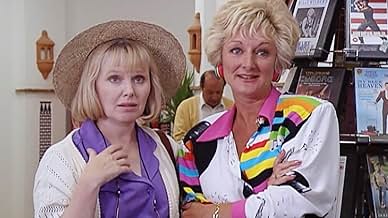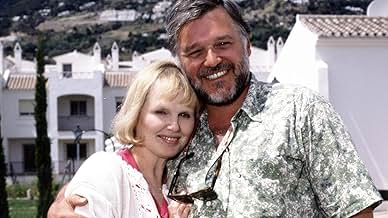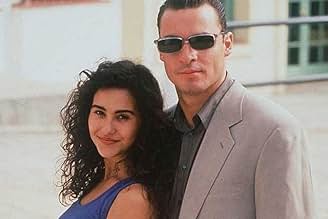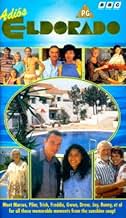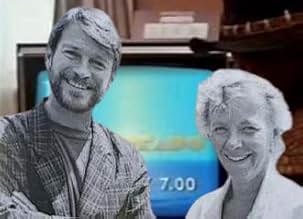A soap opera about the ex-pats who lived in Los Barcos. The series focused mainly on the British and their lives, loves and attempts to make a new life for themselves.A soap opera about the ex-pats who lived in Los Barcos. The series focused mainly on the British and their lives, loves and attempts to make a new life for themselves.A soap opera about the ex-pats who lived in Los Barcos. The series focused mainly on the British and their lives, loves and attempts to make a new life for themselves.
Browse episodes
Featured reviews
I was never a fan of Eldorado but I can remember the blaze of publicity and hype that greeted the Beeb's flagship soap opera - Sean Connery, apparently, at one point, provided the voiceover (this was untrue).
Although it had a better hook than ITV's miserable 'Albion Market', Eldorado was beset by a legion of problems - technical, legal, logistical, administrative and financial - that overwhelmed an overstretched and vaguely defined production. Crucially, it had no central character - no Bet, Den, Charlene or even a Mandy for the viewer to root for.
The BBC were probably right to bring the axe down on an expensive, woodenly acted, muddled white elephant but as Britain totters towards a new phase in our fraught relationship with Europe it makes you wonder what storylines we would be watching today if Eldorado had managed to thrive and survive.
Although it had a better hook than ITV's miserable 'Albion Market', Eldorado was beset by a legion of problems - technical, legal, logistical, administrative and financial - that overwhelmed an overstretched and vaguely defined production. Crucially, it had no central character - no Bet, Den, Charlene or even a Mandy for the viewer to root for.
The BBC were probably right to bring the axe down on an expensive, woodenly acted, muddled white elephant but as Britain totters towards a new phase in our fraught relationship with Europe it makes you wonder what storylines we would be watching today if Eldorado had managed to thrive and survive.
When in 1992 the BBC decided it needed a second soap to relieve the burden on 'Eastenders' to be the networks solo rival to ITV'S 'Coronation Street' and 'Emmerdale' the novel idea of setting it in the sunnier climes of Spain amongst British ex-pats seemed to give the show a unique selling point. Many shows come and go but the fatal blow to this soap opera may have been the original fanfare with which it was launched. The BBC spent £10,000,000 on preliminary sets and production but upon first glance the hugely anticipated drama seemed to have little in the way of story lines or characterisation. There were production problems with the sound that made the show at times impossible to watch.
The hype that the show had been given and the fact that it was funded by the licence payer meant that the British press leapt upon it and it became a favourite object of derision. Initially encouraging viewing figures tumbled to only 3 million per episode and ten months after its fanfare debut the BBC pulled the plug and cancelled the show.
It is well known that the quality of the show and the viewing figures were climbing towards and the end and that perhaps the show was finally starting to catch on. However, the damage had long been done. The media had slated it and tainted it as a joke and from this there was no return for the BBC. The massively expensive sets were mothballed and are now a museum for intrepid tourists and curious TV fans. The shown came to an end satisfactorily and somewhat gracefully (for otherwise see Crossroads #3) but one can only imagine how devastating it was for the actors (other victims of the shows bad initial production) and we can only estimate how much money was poured down the drain on the massively hyped and massively expensive white elephant.
The hype that the show had been given and the fact that it was funded by the licence payer meant that the British press leapt upon it and it became a favourite object of derision. Initially encouraging viewing figures tumbled to only 3 million per episode and ten months after its fanfare debut the BBC pulled the plug and cancelled the show.
It is well known that the quality of the show and the viewing figures were climbing towards and the end and that perhaps the show was finally starting to catch on. However, the damage had long been done. The media had slated it and tainted it as a joke and from this there was no return for the BBC. The massively expensive sets were mothballed and are now a museum for intrepid tourists and curious TV fans. The shown came to an end satisfactorily and somewhat gracefully (for otherwise see Crossroads #3) but one can only imagine how devastating it was for the actors (other victims of the shows bad initial production) and we can only estimate how much money was poured down the drain on the massively hyped and massively expensive white elephant.
With the terrible reviews and screaming front-page headlines it got at the time Eldorado didn't stand a chance. The series was launched in too much of a hurry with too great a fanfare, leading to very high hopes for its fairly poor first episodes. After a little while, with a few of the huge cast removed and a more definite sense of direction, Eldorado became the best soap on British TV. But the damage was done, and it never really gained the place in public affections that it needed. The Beeb pulled the plug after a year.
Eldorado, by the time it finished, was absolutely unique. It had found its place in the world, and knew its direction. It was expending a lot of energy exploring the nature of people who leave their motherland and o to live in the sun. So much was revealed about the true nature of ex-pats, and some characters who seemed a bit faceless at the beginning were revealed as far more complex once they were given a bit of screen time to themselves. In Freddie Martin, Eldorado gave us one of TV's greatest gay characters: his reunion with his longlost daughter, Natalie, and his silent grief at the death of his secret boyfriend, Javier, were immaculately written and performed.
Eldorado was able to give great depth and involvement to the idea of culture clash, and to highlight what life in the "new" Europe was really like (boo-hiss baddie Marcus Tandy calls German Dieter "Adolf" at one point). There were characters and relationships never seen on TV, before or since (the Leducs' open marriage, modern Spanish women breaking away from traditional Catholic families, gay parents), and plenty of imagination given to thoroughly original storylines.
After the dodgy beginning, Eldorado became the most unique TV show that the BBC had ever tried. Ten years on, I still think it's a shame they didn't have the confidence to carry it through. Mind you, the last episode was a corker.
Eldorado, by the time it finished, was absolutely unique. It had found its place in the world, and knew its direction. It was expending a lot of energy exploring the nature of people who leave their motherland and o to live in the sun. So much was revealed about the true nature of ex-pats, and some characters who seemed a bit faceless at the beginning were revealed as far more complex once they were given a bit of screen time to themselves. In Freddie Martin, Eldorado gave us one of TV's greatest gay characters: his reunion with his longlost daughter, Natalie, and his silent grief at the death of his secret boyfriend, Javier, were immaculately written and performed.
Eldorado was able to give great depth and involvement to the idea of culture clash, and to highlight what life in the "new" Europe was really like (boo-hiss baddie Marcus Tandy calls German Dieter "Adolf" at one point). There were characters and relationships never seen on TV, before or since (the Leducs' open marriage, modern Spanish women breaking away from traditional Catholic families, gay parents), and plenty of imagination given to thoroughly original storylines.
After the dodgy beginning, Eldorado became the most unique TV show that the BBC had ever tried. Ten years on, I still think it's a shame they didn't have the confidence to carry it through. Mind you, the last episode was a corker.
Not a bad soap. However, the BBC, in its wisdom, decided to pull the plug when it seemed to be getting off the ground. This decision has always seemed a puzzle when programmes of questionable quality are screened by the same organization. It was sad to lose this programme, and how much public money was thrown away?
The axing of this show was purely a political decision. The show was doomed from the offset. The BBC pumped loads of money into the show and expected to make immediate profits which was not going to happen no matter how good the show was. As for the show itself. I loved it. It was a little slow to start with but it was a soap opera and for anyone to be able to get to know the characters right away was asking a bit too much. It was to take time and the BBC were not prepared to give it this required time. The most memorable character was of course Marcus (Jesse Birdsall) who fitted the "bad boy" image perfectly. The man with a hard exterior but a soft centre. Most of the actors played their parts magnificently but there were a few exceptions at the start but those actors were soon axed. I'd love to see the whole series again as I can now find myself in a similar position as most of the characters in the show - I'm an expat myself now and socialise with an expat community. It's a pity it was axed just as the show was becoming popular and the plots were becoming more interesting. Thank you BBC :(
Did you know
- TriviaThe BBC spent two million pounds to build the set.
- ConnectionsFeatured in 100 Greatest TV Moments from Hell (2000)
- SoundtracksWhen You Go Away
Performed by Johnny Griggs [final episode only]
Composed by Simon May
[series theme tune]
- How many seasons does Eldorado have?Powered by Alexa
Details
Contribute to this page
Suggest an edit or add missing content


